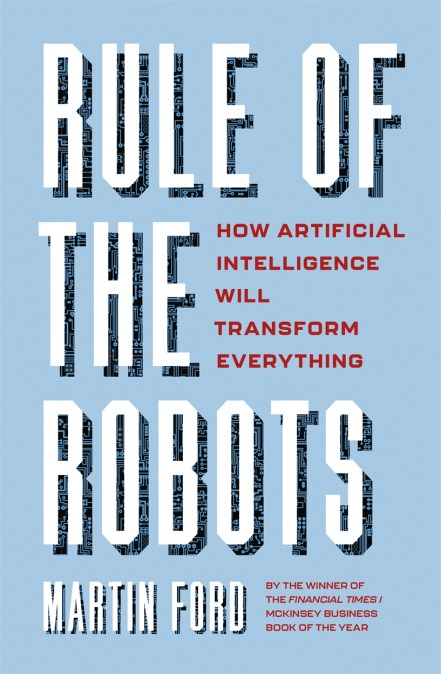‘The best up-to-date, go-to book on the social and economic implications of artificial intelligence – Tyler Cowen’
Rule of the Robots explores the future implications of artificial intelligence as a uniquely scalable and potentially disruptive technology.
In this sequel to his prescient New York Times bestseller Rise of the Robots, Martin Ford presents us with a striking vision of the very near future. He argues that AI is a uniquely powerful technology, a kind of “electricity of intelligence” that is altering every dimension of human life, often for the better with advanced science being done by machines who can solve problems humans can not. AI has the potential to help us fight climate change or the next pandemic, but it also has a capacity for profound harm. Deep fakes-AI-generated audio or video of events that never happened-are poised to cause havoc throughout society. AI empowers authoritarian regimes like China with unprecedented mechanisms for social control. And AI can be deeply biased, learning bigoted attitudes from the data used to train algorithms and perpetuating them.
Hard-hitting and thought-provoking, covering everything from self-driving cars to the history of deep learning to apps for diagnosing skin cancer, Rule of the Robots challenges our fears and preconceptions about artificial intelligence. Ford argues that AI is here to stay and the real question is not how to stop it, but how to control its negative potential and harness its power for good as AI transforms our economy, our politics, and our lives.
Rule of the Robots explores the future implications of artificial intelligence as a uniquely scalable and potentially disruptive technology.
In this sequel to his prescient New York Times bestseller Rise of the Robots, Martin Ford presents us with a striking vision of the very near future. He argues that AI is a uniquely powerful technology, a kind of “electricity of intelligence” that is altering every dimension of human life, often for the better with advanced science being done by machines who can solve problems humans can not. AI has the potential to help us fight climate change or the next pandemic, but it also has a capacity for profound harm. Deep fakes-AI-generated audio or video of events that never happened-are poised to cause havoc throughout society. AI empowers authoritarian regimes like China with unprecedented mechanisms for social control. And AI can be deeply biased, learning bigoted attitudes from the data used to train algorithms and perpetuating them.
Hard-hitting and thought-provoking, covering everything from self-driving cars to the history of deep learning to apps for diagnosing skin cancer, Rule of the Robots challenges our fears and preconceptions about artificial intelligence. Ford argues that AI is here to stay and the real question is not how to stop it, but how to control its negative potential and harness its power for good as AI transforms our economy, our politics, and our lives.
Newsletter Signup
By clicking ‘Sign Up,’ I acknowledge that I have read and agree to Hachette Book Group’s Privacy Policy and Terms of Use
Reviews
Probably the most compelling single-volume book so far on AI's advance and the opportunities and challenges associated with its multi-faceted impact on the world. Those in AI and those outside it will get a lot out of his clear-eyed and critical perspective. I highly recommend it
There is no technology more important today than AI. Martin Ford continues his tradition of clear insights and observations about this important topic in a well-researched page-turner. A delightful book!
The best up-to-date, go-to book on the social and economic implications of artificial intelligence
An incisive, balanced, and well-informed discussion of where AI stands today, how it may evolve, and the risks it poses to human society
Writing about the future of robotics is a dangerous endeavor, since it illuminates every aspect of our lives with a startling, uncharted perspective. Ford navigates this challenge admirably, with an exceptional blend of depth, rigor and clarity
Rule of the Robots is subtle and clever, a book that will challenge readers to reassess their position on AI
According to software developer Martin Ford, artificial intelligence (AI) will probably transform society faster than electricity did, but with unpredictable effects. His well-informed study notes a 2016 forecast that within five years, radiologists would be overtaken by advances in AI. But that hasn't happened: AI cannot currently integrate key information from sources such as clinical notes. AI's future, Ford concludes, lies somewhere between the science-fictional extremes of utopian Star Trek and dystopian The Matrix
A good read and . . . a balanced perspective on both the benefits and costs of increasingly widespread use of AI

